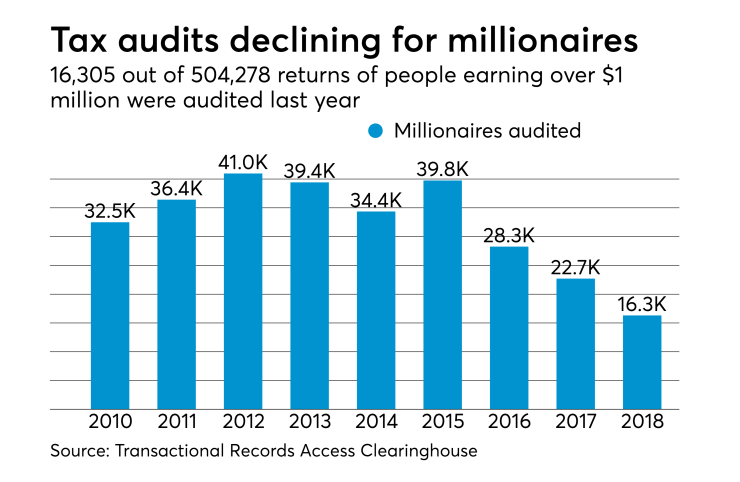The Internal Revenue Service audited just 0.59 percent of individual tax returns in fiscal year 2018, a slight decrease as the agency continues to suffer from budget cuts and staff reductions.
Cuts in the IRS budget from $14 billion in 2010 to approximately $12 billion in 2017 have resulted in staff reductions by about one-third during that time frame, according to Glenn DiBenedetto, a CPA and director of tax planning at New England Investment and Retirement Group. “IRS staffing dropped to less than 10,000 agents for the first time since 1953,” he said.
As a result of the cuts, audit rates have dropped for all income groups, but at a much greater percentage for high-income earners, he explained. “Audits of people earning over $10 million dropped 52 percent between 2011 and 2017, according to ProPublica.”
A study by the Transactional Records Access Clearinghouse at Syracuse University found a similarly steep drop in audits of millionaires; nevertheless, the audit rate for high earners — at 6.66 percent in 2018 — is much higher than the 0.59 percent overall rate for individual returns.
The Tax Cuts and Jobs Act includes tax savings opportunities for high-net-worth clients, while eliminating a number of deductions that might have triggered audits for those in the lower brackets, according to DiBenedetto.

“The average employee used to take advantage of miscellaneous itemized deductions such as employee business expenses and entertainment expenses,” he said. “The elimination of those deductions took away an area of high audits.”
“But high earners will have complexities with their returns that the lower earners don’t have,” he observed. “They often have multiple limited partnerships and complicated investments. They have a greater ability — and need — to hire advisors to develop strategies, and tend to get audited on any ‘gray area’ positions they take.”
“The TCJA made available a number of opportunities that might trigger an audit,” he said. “This includes the 20 percent qualified business income deduction on certain income from pass-through entities and other investments. Lack of clarity, income thresholds, and other limitations have prompted tax professionals to seek and develop strategies to maximize the benefits for their clients. Likewise, opportunities for changes in accounting methods became available. These include the use of the cash method of accounting and reduced inventory tracking, available for taxpayers that meet the $25 million gross receipts test.”
And individual returns may be audited in connection with a pass-through entity, DiBenedetto noted: “Keep in mind that most of these changes came into play for the first time in 2018, and the IRS may take some years before they gear up to audit the various changes brought on by the Tax Cuts and Jobs Act.”
Unlike individual returns, estate tax returns are routinely audited, according to Linda Hirschson, a shareholder at law firm Greenberg Traurig.
“Basically, if an estate is a taxable estate and is sufficiently large, we assume it will result in an estate tax audit,” she said. ”If there’s no surviving spouse and the estate exceeds the available exemption, we assume it will be audited. If there’s a surviving spouse and a marital deduction, it’s possible that it won’t be at the death of the first spouse, but if it’s large enough, it would be audited on the death of the surviving spouse.”
Hirschson advises estate tax return preparers to be forthcoming in disclosing information relevant to the return.
“My preference is to be as inclusive as possible on the estate tax return,” she said. “The IRS should have all the information it needs, and doesn’t have to come back to you and ask ‘Where’s this?’ Make sure that everything is complete.”





